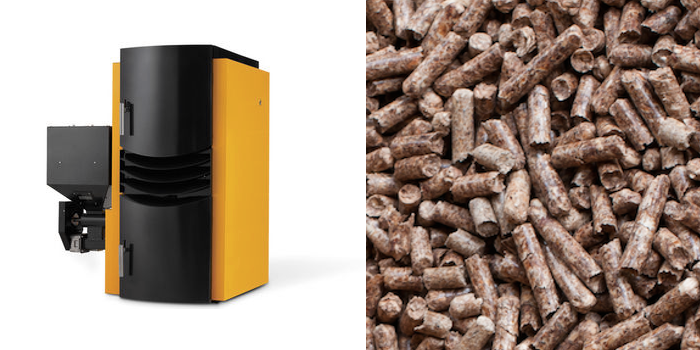
Biomass has seen a boom in popularity since the Renewable Heat Incentive (RHI) was introduced in April 2014. The RHI payment was introduced to drive up take of heating systems that produced spacing heating and hot water from low carbon sources.
Biomass in certain situations has been extremely popular, the reason being that unlike the other renewable heating systems (e.g. heat pumps and solar thermal), it produces hot water to a similar temperature compared to conventional central heating systems (oil and natural gas).
In addition, if the heat demand of the property is relatively high then the payback of the system can be extremely quick. We installed a heat pump in Guildford, Surrey a while back and the RHI payment over the 7 years was £49,000 on a £22,000 investment. Not a bad return!
As a result of these two things, over the last year or so hundreds of companies have sprung up seemingly out of nowhere offering free Biomass boilers. Provided they choose their targets well (properties with high heat demand), this was a relatively low risk strategy since the signed-over RHI payments would comfortably cover the install costs and provide the installation company a healthy rate of return.
RHI budgets
First a bit of background on how the RHI is allocated.
The amount the Government set aside for the each of the technologies to cover the RHI payments is independent from one another. This means that if one technology is more popular than the other, it will have no bearing on the less popular technology’s subsidy payments. As the budget gets spent, the payments are lowered via what’s known as a digression – this is basically where the tariff drops by a few percent. This in theory makes the investment less attractive as it lowers the return for homeowners, as well as lowering the return for these ‘Free Biomass boiler installers’!
20% Biomass RHI Tariff Digression
On the 27th February, DECC confirmed that the ‘Super trigger’ had been hit and therefore they needed to aggressively cut demand of biomass boilers to try and make the budget pot last longer for this technology, as a result, from April 1st 2015 the payment is reduced by 20%. That means if you have a system installed and make an RHI application for the a biomass boiler, your return will be 20% lower than if you made the application today – not ideal!

This will obviously make biomass less popular as a renewable heating solution, but it will have no bearing on any of the other renewable heating options. The ‘super trigger’ digression is only applicable to biomass and all the other RHI tariffs for the other technologies are actually going up slightly in line with inflation.
- ASHP up to 31st March 2015 – payment is 7.30p / kWh
- ASHP after 1st April 2015 – payment is 7.42p / kWh
- GSHP up to 31st March 2015 – payment is 18.80p / kWh
- GSHP after 1st April 2015 – payment is 19.10p / kWh
- Solar Thermal up to 31st March 2015 – payment is 19.20p /kWh
- Solar Thermal after 1st April 2015 – payment is 19.51p /kWh
Obviously only slight increases to the RHI payments for the other technologies, but not too bad!
What does it mean for the future of Biomass Boilers?
Biomass is going to remain popular, but I think the Government were keen to cull the companies offering it for free. You may remember there was a rent a roof solar scheme that operated in a similar way a couple of years ago. The generosity of the Feed-in tariff actually created a massive boom and bust industry. The Government were forced to halve the FIT payments literally overnight and it left a huge number of people unemployed, so I guess DECC are keen to avoid a repeat.
Don’t let this 20% digression in the biomass RHI payment put you off if you are looking to invest. Obviously the return will be less, but in some cases you can still make a huge return by investing in this technology, especially if you are living off the mains gas grid in a property with a large heat demand.












Me and my wife are retired but we have quite a bit of disposable income now to spend following the changes to the pension rules. We live near Rickmansworth and our current oil boiler is not only expensive but rather dirty and gastly to have outside your kitchen window. Two quick questions:
1. Is the rhi means tested?
2. Can i get the rhi for a log burning stove with back boiler?
Any help here would be terrific!
Hi Gregg,
The RHI is not means tested. Anyone is eligible.
You can potentially get RHI for your stove, as long as it does provide hot water via a back boiler. A standard wood burner will not be eligible.
I got in just before Christmas with ours and we are making £1700 a year from biomass boiler! It seems with all of these Government schemes, the key to it is getting in quick! We got solar in July 2011 and we are on the 43p tariff there too
SMUG 🙂
Hi
How did you find your solar supplier?